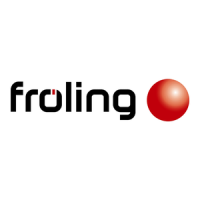Permitted water hardness for the fill and make-up water in accordance with VDI 2035:
Overall heat
output
Total hardness at
<20 l/kW minimum
individual heat output
1)
Total hardness at
>20 ≤50 l/kW minimum
individual heat output
1)
Total hardness at
>50 l/kW minimum
individual heat output
1)
kW °dH mol/m³ °dH mol/m³ °dH mol/m³
≤50 no demand or 11.2 2 0.11 0.02
<16.8
2)
<3
2)
>50 ≤200 11.2 2 8.4 1.5
>200 ≤600 8.4 1.5 0.11 0.02
>600 0.11 0.02
1.From specific system volume (litres nominal capacity/heat output; for multi-boiler systems use the smallest individual heat output)
2.
In the case of systems with central heating boilers and for systems with electric heating elements
Additional requirements for Switzerland
The filling and make-up water must be demineralised (fully purified)
▪
The water must not contain any ingredients that could settle and accumulate in the
system
▪ This makes the water non-electroconductive, which prevents corrosion
▪ It also removes all the neutral salts such as chloride, sulphate and nitrate which can
weaken corrosive materials in certain conditions
If some of the system water is lost, e.g. during repairs, the make-up water must also be
demineralised. It is not enough to soften the water. The heating system must be
professionally cleaned and rinsed before filling the units.
Inspection:
▪ After eight weeks, the pH value of the water must be between 8.2 and 10.0. If the central
heating water comes into contact with aluminium, the pH value must be between 8.0 and
8.5
▪ Yearly. Values must be recorded by the owner
Notes for operating a heating system
3
Requirements for central heating water
Operating Instructions T4e | B1560520_en 21

